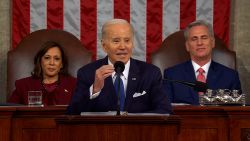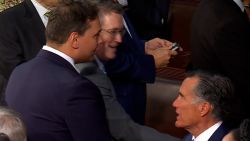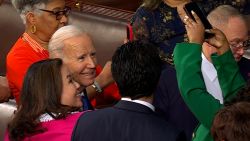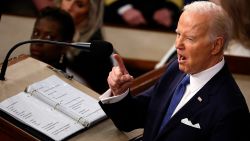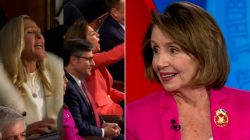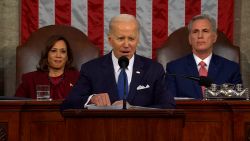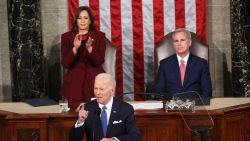When President Joe Biden took to the House Chamber on Tuesday for his annual State of the Union address, his message was one of unadulterated optimism – even in the face of open hostility.
The spectacle of Biden smiling and offering a pointed riposte through multiple rounds of heckling from some House Republicans was, in many ways, an apt illustration of his presidency and a useful preview of his likely 2024 candidacy.
A majority of Americans say he hasn’t accomplished much, many Democrats aren’t thrilled at the prospect of him running for reelection and he faces clear disdain from most Republicans.
But Biden powered through. Delivering what was widely viewed as a test run for his reelection announcement, Biden claimed credit for progress made during his first two years in office while stressing the job isn’t finished.
He faced sometimes-unruly Republicans, with whom he spiritedly sparred from the podium on spending cuts. The feisty display drew cheers inside the White House and offered the best preview to date of the energy Biden hopes to bring to the campaign trail soon.

The speech carried a strain of populism rooted in strengthening the middle class – vintage Biden, but delivered at a pivotal moment for his political future.
No president enters his State of the Union wanting to recite a laundry list of accomplishments and proposals, but – almost inevitably – the speech often veers in that direction. Biden’s was no different, even as the president sought to tie everything together with a refrain of “finish the job” – a phrase that appeared 12 times in his prepared text.
Rather than tout any one accomplishment, however, Biden hoped to address the national mood, one that remains downbeat even as the economy improves and the country attempts to return to normal amid the Covid-19 pandemic.
Here are six takeaways from Biden’s State of the Union:
Biden spars with sometimes-unruly Republicans
In a room full of elected officials, identifying an adult shouldn’t be difficult. But heading into Tuesday’s speech, both Republican leaders and Biden’s team telegraphed a desire to act as the night’s “adult in the room” – the mature voice seeking common ground and lowering the temperature.
For the first 45 minutes of Biden’s address, that appeared to be the play for both sides. But when Biden began castigating Republicans for plans that would slash Social Security and Medicare, the decorum dropped.
His accusations seemed to provoke Republicans, who lobbed accusations of “liar” from their seats in the chamber.

That in itself wasn’t unprecedented. What happened next was rarer: Biden leaned into the opening, responding and engaging his hecklers.
“I enjoy conversion,” he quipped, suggesting they were in agreement on the need to protect the programs for senior citizens.
For Biden, House Republicans act as a useful foil as he prepares to announce his intentions for 2024. His jousting on Tuesday was the best glimpse of how he’ll approach his candidacy, at least until a Republican opponent emerges from the GOP primary process.
White House officials were thrilled by the off script back and forth.
“Couldn’t have written a better moment,” one official said.
More than the substantive back and forth, one official noted how it appeared to animate Biden in real time.
“He gets energy from his audience,” the official said. It’s not a new view on how Biden operates - his advisers constantly talk about how he finds his energy from engaging with people.
Biden and his team believe a serious focus on governing contrasts favorably with House Republicans, who they accuse of threatening to send the nation into default and piling up distractions as they investigate the president and his family.
House Speaker Kevin McCarthy entered the speech vowing to treat Biden respectfully – and urging his Republican colleagues to do the same. It was a tall order, given the loose grasp he has on his conference and the propensity from certain Republicans for stunts.
As lawmakers like Georgia Rep. Marjorie Taylor Greene interrupted Biden, McCarthy was silent – but his glare into the crowd spoke for itself. Later he found himself shushing his conference multiple times at outbursts interrupted the president.
Showing vigor

For the third year in a row, Biden set the record for the oldest president to deliver an address to a joint session of Congress. It’s an underlying fact of his presidency: No one older has ever served.
As Biden prepares to ask voters to keep him in office until he is 86, it was critical he look and sound like someone who is able to keep doing the job.
His delivery was energetic, even if he stumbled over a few of his prepared lines. When Republicans interrupted him, he responded quickly, deftly turning their heckles back around into challenges.
Over the weekend at Camp David, aides set up a podium, microphone, lights and teleprompter in a conference room inside the Laurel Lodge for Biden to practice his speech with his team. The potential for hecklers was something White House officials had in mind as they prepared for the speech.
At the White House, a similar set up has been used in the Map Room to practice the address.
Aides were focused on the message – but also the language, ensuring the speech lent itself to a vigorous presentation. After all, for many in Biden’s television audience, Tuesday’s speech was one of the only times they actually heard and saw the president this year.
Vintage Biden
Perhaps more than his previous two addresses to Congress, Tuesday’s speech was salted with riffs and lines that appear nearly every time he speaks: inherited wisdoms from his father, anecdotes about inequality and his views of the middle class.
“So many of you feel like you’ve just been forgotten,” he said, directly appealing to a demographic that used to vote reliably for Democrats but has more recently turned to the GOP.
“Amid the economic upheaval of the past four decades, too many people have been left behind or treated like they’re invisible. Maybe that’s you, watching at home,” he said. “You wonder whether a path even exists anymore for you and your children to get ahead without moving away.”
“I get that,” he said.
Appearing for the first time in front of a divided Congress, Biden also leaned into his record working across the aisle – even as he faced heckling from Republicans.
In many ways, both Biden and McCarthy hoped a more mature showing would set the tone for the next two years of divided government, even if they remain sharply divided on policy.

“Mr. Speaker, I don’t want to ruin your reputation but I look forward to working together,” Biden said as he launched into his speech.
He acknowledged that over the first years of his presidency “we disagreed plenty.” But he appealed to his political rivals for cooperation.
“To my Republican friends, if we could work together in the last Congress, there is no reason we can’t work together in this Congress as well,” he said.
Trying to connect
If there is one political conundrum Biden’s advisers are urgently working to solve, it is why so many Americans seem to believe he has accomplished so little. By all accounts, Biden has passed large, historic pieces of legislation that could have transformational effects on the US economy. But polls show large majorities aren’t feeling them.
Biden hoped in his speech to bridge that gap, to demonstrate he cares about what Americans care about and to identify the problems he’s looking to fix.
His focus on highly specific issues – like eliminating “junk fees” for consumers or reining in tech companies – are areas the White House believes will resonate with Americans who aren’t necessarily attuned to the ins-and-outs of Washington.
At moments, his speech seemed tailor-made for a nation of annoyed consumers, down to annoyances about baggage fees on airlines and fine print on hotel bills.
“Americans are tired of being played for suckers,” he said, listing off the litany of common grievances.
But Biden and his team are acutely aware that simply telling people their lives are improving won’t cut it – they have to actually feel it. Many of the accomplishments Biden helped passed over the past two years are still in the implementation phase, making their effects elusive for now.
Biden seemed to acknowledge that when he urged lawmakers to extend a price cap on insulin – a benefit that is still coming into effect.
China focus
The furious Republican backlash to Biden’s handling of a suspected Chinese spy balloon proved illustrative for many at the White House.

China was included in the text of Biden’s speech well before the balloon slipped into American airspace. But the incursion, which has generated a diplomatic backlash from China and drawn second-guessing from Republicans, lent new urgency to Biden’s message about competing with Beijing.
“Make no mistake: As we made clear last week, if China threatens our sovereignty, we will act to protect our country. And we did,” Biden said in his speech.
Biden and his aides believe steps to counter China are one of the rare areas where he could find bipartisan support. He saw some success on that front with the passage of a law boosting US semiconductor production last year.
Biden is sensitive to accusations he is weak on China, according to people around him, while still intent on stabilizing the world’s most important bilateral relationship.
Republicans look to ‘new generation’
The GOP’s choice to deliver their response to Biden’s speech, Arkansas Gov. Sarah Huckabee Sanders, is – at 40 years old – the nation’s youngest governor. Half the president’s age, her selection was a clear choice to contrast a different generation of leaders.
In part because she lacked an audience and in part because Biden was energetically provoked by Republicans in his own address, her speech was a far more staid affair than the State of the Union. Delivered solemnly from the governor’s mansion in Little Rock, the speech was instead a somewhat dark warning against Democratic policies she deemed “crazy,” a descriptor she used three times.
“The dividing line in America is no longer between right or left,” she said. “The choice is between normal or crazy.”
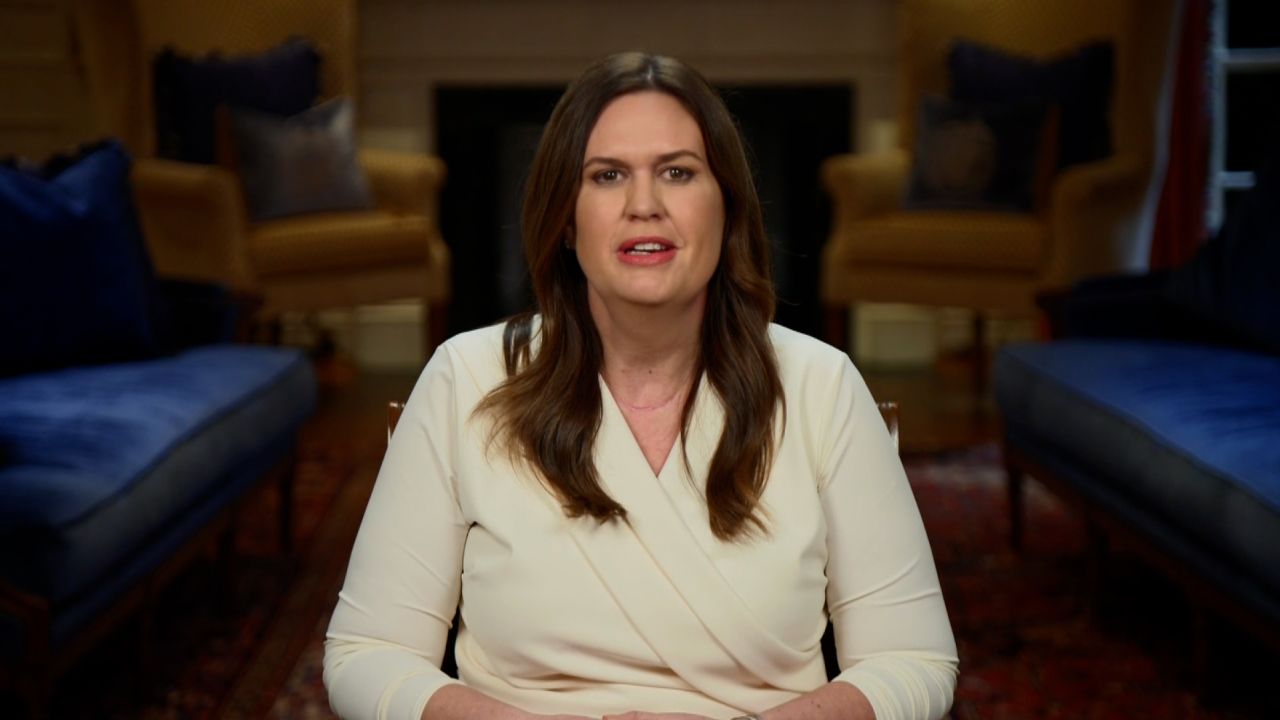
She accused the Biden administration of appearing “more interested in woke fantasies than the hard reality Americans face every day” and leaned heavily on culture war issues that she claimed her party “didn’t start and never wanted to fight.”
And while she cited her tenure as White House press secretary to Donald Trump, she did not rely heavily on her association with the former president.
Instead, she appeared to call for a changing of the guard – an appeal for generational change that could apply as much to Democrats and Biden as it could to Republicans and Trump.
“It’s time for a new generation to lead. This is our moment. This is our opportunity,” she said.


